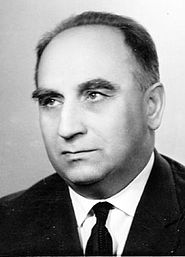Stefan Jędrychowski
| Stefan Jędrychowski | |
|---|---|
 |
|
| Minister of Finance | |
|
In office 1971–1974 |
|
| Minister of Foreign Affairs | |
|
In office 22 December 1968 – 22 December 1971 |
|
| Preceded by | Adam Rapacki |
| Succeeded by | Stefan Olszowski |
| Deputy Prime Minister | |
|
In office 12 December 1951 – 24 October 1956 |
|
| Preceded by | Hipolit Chelchowski |
| Succeeded by | Tadeusz Gade |
| Personal details | |
| Born | 9 May 1910 Warsaw |
| Died | 1996 (aged 85-86) |
| Nationality | Polish |
| Political party |
Soviet Communist Party Polish United Workers' Party |
| Alma mater | Stefan Batory University |
Stefan Jędrychowski (9 May 1910 - 1996) was a Polish journalist and communist politician, who served as deputy prime minister, foreign minister and finance minister in Poland.
Born in Warsaw on 9 May 1910, Jędrychowski hailed from a middle-class Catholic family, who owned properties and apartment houses in Wilno, then in the Russian part of Poland. His mother was of German origin.
He studied law and social science at Stefan Batory University in Wilno, graduating in 1932. Then he obtained a master's degree in law from the same university. He also received a PhD in economics. He began his political career as a radical leftist Catholic in the group called "Odrodzenie" (renaissance) when he was an undergraduate student. Then he switched to a youth organization "Legion Mlodych" (The Legion of Youth) that was founded by Józef Piłsudski after he took over the Polish government in 1926. Jędrychowski became a member of the group's regional command.
Jędrychowski began his career as an assistant lecturer in economics at Stefan Batory University. In 1936, he joined the Communist Party. In September 1939, he began to work as a journalist in Wilno. Then he was named deputy editor of the local communist daily which had been published by the Soviet authorities. He became a Soviet citizen and a member of the Soviet Communist Party. Following the annexation of Lithuania to the Soviet Union he served at the Supreme Soviet as a deputy.
Later he continued his activities in the Polish committee of national liberation’ (PKWN), which was formed on 22 July 1944. Shortly after he began to serve as the PKWN's representative in Moscow. He was also the Warsaw government’s delegate in France in 1945. In addition, he headed the department of information and propaganda under the PKWN. From 1945 to 1947 he served as minister of navigation and foreign trade in the national unity government. Next he joined the Polish United Workers' party. And he became an alternate member of the party's central committee or politburo.
...
Wikipedia
